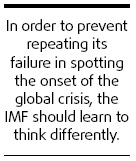Editorials
A necessary try for IMF
(China Daily)
Updated: 2010-02-26 07:47
 |
Large Medium Small |
The appointment of Zhu Min, deputy governor of the Chinese central bank, as a special adviser to the head of the International Monetary Fund (IMF), highlights China's increasing influence in the global financial system.
With the Chinese economy taking the lead in helping lift the world out of the worst global recession in decades, it would seem natural for Chinese to give more advice to more ears from the international community.
In fact, the selection in 2008 of Justin Yifu Lin, a leading Chinese academic, as vice- president and chief economist of the World Bank, had started the export of Chinese wisdom that more and more global institutions seek.
| ||||
However, this appointment is more than simply a validation of China's greater sway in the global financial system.

By recognizing the increasingly important role China can play in guiding its policy decisions, the IMF is trying to prepare itself for the new challenges it will face in a global economic and financial landscape that is changing fundamentally.
With emerging markets and developing countries assuming a greater role in the global economy, the IMF can't keep dragging its foot on its own reform to reflect the new reality. To include more professionals from these economies into management is the first step to reflect the changes in the world economic landscape and to improve their governance.
If this international organization is to effectively monitor systemic risks and prevent a global financial crisis from happening again, it must look beyond its old policy manuals for new perspectives to understand problems and new measures to fix them.
By bringing Zhu into its management team, the IMF will not only be able to tap into his wealth of experience to strengthen its understanding of Asia and emerging markets, but more importantly, the IMF will also better grasp the Chinese perspective on the causes, effects and solutions of the so-called global imbalance.
Echoing the blame by some Western countries on the Chinese currency does not indicate improvement on the IMF's capability in monitoring the global economic system.
In order to prevent repeating its failure in spotting the onset of the global crisis, the IMF should learn to think differently. It is believed that Zhu's counsel will help immensely in this regard.
(China Daily 02/26/2010 page8)













